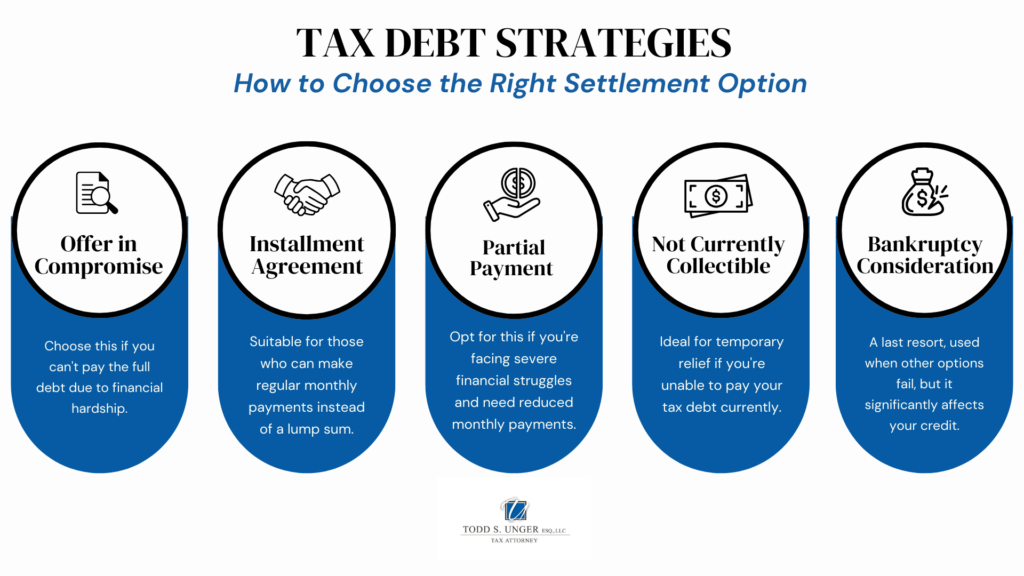
Understanding Your Settlement Options
the complexities of tax debt can be daunting, and understanding your options is the first step toward finding a solution. A tax settlement is a potential lifeline for those with significant tax liabilities. But what exactly is a tax settlement?
In simple terms, it’s an agreement negotiated with the IRS to resolve your tax debt under more favorable and manageable terms than the original amount owed. As a seasoned tax attorney, I’ve guided numerous clients through this intricate process, helping them to discern whether a tax settlement aligns with their financial circumstances and long-term goals.
Different Types of Tax Settlement Options
The IRS presents various settlement options, each tailored to address different aspects of tax debt.
One of the most prominent is the Offer in Compromise (OIC). This option allows taxpayers to settle their tax debts for less than the full amount owed, contingent on demonstrating that full payment would cause significant financial distress. The OIC is particularly beneficial for those who may not have the assets or income to cover their tax debt in full.
Another avenue is the Installment Agreement, which lets taxpayers pay off their debt in smaller, more manageable monthly installments. This option is often a relief for those who can afford to pay their debt over time but cannot make a large lump sum payment.
For taxpayers experiencing more severe financial challenges, the Partial Payment Installment Agreement may offer a solution. This arrangement involves smaller monthly payments than a standard installment agreement and can sometimes lead to a reduction in the total debt.
The Not Currently Collectible (NCC) status is another vital option, particularly for individuals and businesses in dire financial straits. Under NCC, the IRS temporarily halts collection activities, recognizing that taxpayers cannot pay their tax debt then.
Lastly, in certain situations, bankruptcy might be considered. While bankruptcy can lead to the discharge of some tax debts, it’s often viewed as a last resort due to its significant impact on one’s financial standing and credit score.
 Pros of Tax Settlements
Pros of Tax Settlements
Tax settlements offer significant advantages for those struggling with tax debt, transforming a daunting financial burden into a more manageable scenario. Key benefits include:
- Debt Reduction: Significant lowering of the total tax debt for eligible taxpayers, making payments more feasible.
- Avoidance of IRS Collections: Prevention of extreme measures like liens, wage garnishments, and levies.
- Financial Relief: Provides a path to clear longstanding tax debts and helps regain financial stability.
- Peace of Mind: Offers a fresh start, allowing taxpayers to move forward without the stress of overwhelming tax debt.
Cons of Tax Settlements
However, tax settlements are not a one-size-fits-all solution and have their share of challenges. The most significant hurdle is the stringent eligibility criteria set by the IRS. Not everyone qualifies for an OIC, and the assessment process involves a thorough examination of the taxpayer’s financial situation. The process can be lengthy and complex, and there’s always the risk that the application might be rejected.
In such cases, the taxpayer might find themselves in a more precarious position, especially if penalties and interest have continued to accrue during the application period. Furthermore, applying for a tax settlement can invite increased scrutiny of your financial affairs.
Tax Settlements vs. Bankruptcy
When faced with overwhelming tax debt, it’s key to understand the distinction between tax settlements and bankruptcy. Both routes offer a way to manage tax liabilities but differ significantly in terms of their long-term impact and suitability for different financial situations.
Tax settlements, as discussed, involve negotiating with the IRS to pay off your tax debt in a manner that is more aligned with your financial capabilities. This can include reducing the total debt or extending the payment period. The key advantage here is the potential for a significant reduction in what you owe without the severe long-term consequences that bankruptcy can bring.
On the other hand, bankruptcy, specifically Chapter 7 or 13, can sometimes lead to the discharge of certain tax debts. It’s a more drastic measure that can provide relief from tax debt and other types of debt. However, bankruptcy can profoundly impact your credit score; it may require liquidation of your assets, and not all tax debts are eligible for discharge under bankruptcy. Additionally, bankruptcy becomes a matter of public record, which can have personal and professional implications.
 Understanding the Application Process
Understanding the Application Process
Each settlement option, whether an Offer in Compromise (OIC) or various installment agreements, has unique forms and specific documentation needs. The key to a successful application lies in several critical steps:
- Providing Detailed Documentation includes fully disclosing your income, regular expenses, assets, and liabilities. The IRS uses this detailed financial snapshot to assess your ability to pay and determine the most appropriate settlement option.
- Filling Out Accurate and Complete Forms – Each tax settlement type, like OIC or installment agreements, requires specific forms. Ensuring these forms are filled out with utmost accuracy is crucial.
- Practicing Full Disclosure – Transparency is key when dealing with the IRS. This openness is vital not only for the integrity of your application but also for establishing trust in your financial disclosures.
- Paying Attention to Detail – The application process for tax settlements is unforgiving when it comes to errors or omissions. A mistake or a missed piece of information can result in the rejection of your application or, worse, lead to accusations of fraudulent activity.
- Submitting Comprehensive Information – The completeness of your application is a critical factor in its evaluation. Leaving out information, even unintentionally, can hinder the process or negatively impact the outcome.
The Role of Tax Professionals in Tax Settlements
Going through the complexities of tax settlements is a task best undertaken with the guidance of a seasoned tax professional. As a tax attorney or certified tax resolution specialist, I bring knowledge about tax laws, IRS procedures, and the intricacies of various settlement options. My role is to evaluate your financial situation carefully, recommend the most appropriate settlement type, and skillfully negotiate with the IRS on your behalf.
Remember, every financial scenario is unique, and resolving tax issues effectively requires a strategy customized to your individual needs and circumstances. Making well-informed decisions is crucial, and professional guidance is key in successfully navigating the complex world of tax settlements. If you’re considering your tax settlement options and need expert advice, I encourage you to contact me, Todd S. Unger, for a consultation. Call now! (877) 544-4743

